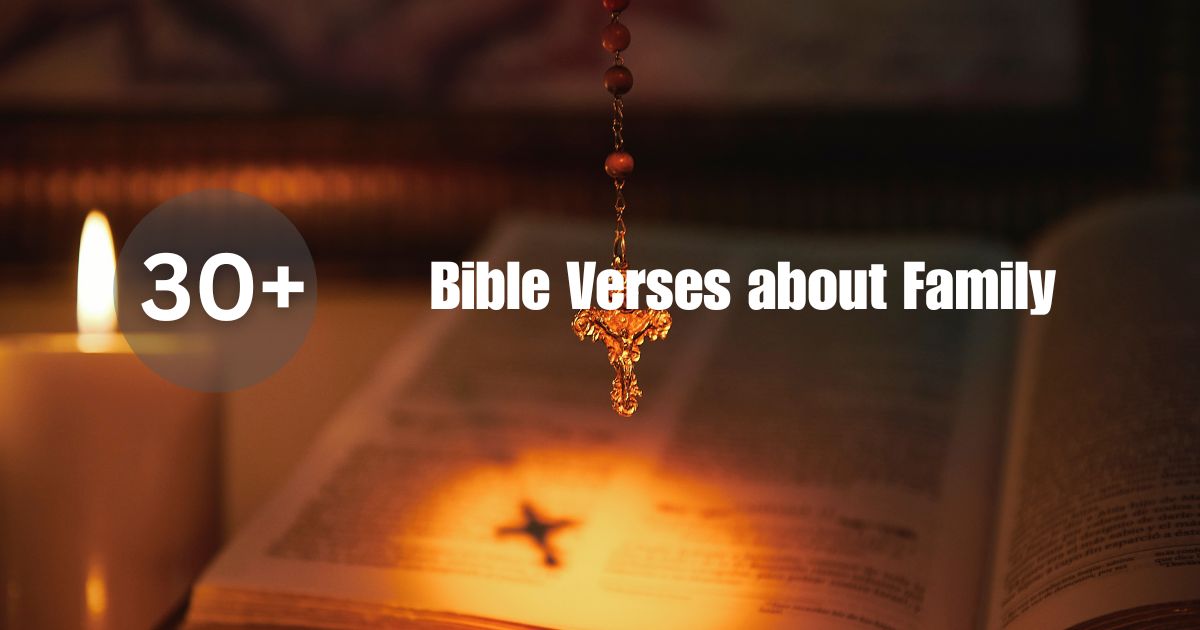Family is the heart of life, yet it can also be the place where we face our greatest tests. Many people search for direction when love feels strained or when daily struggles make it hard to stay united. These moments often lead us to seek comfort and strength in faith. Turning to Bible Verses about Family helps us remember that every home can find peace when it is built on God’s truth.
Each verse carries a reminder that family is more than shared blood or a name. It is a space shaped by patience, forgiveness, and unconditional love. Whether someone is holding a family together through challenges or seeking healing from old wounds, these scriptures bring guidance that speaks to both the heart and the home.
What Does The Bible Say About Family?
The Bible teaches that family is a precious gift from God and the foundation of love, faith, and unity. It reminds us to honor our parents, love one another, and guide children with wisdom and care. Families are meant to support each other, stay strong in faith, and live in peace together.
Verses like Ephesians 6:1–2 (“Children, obey your parents in the Lord, for this is right”) and Proverbs 22:6 (“Start children off on the way they should go”) show that love, respect, and guidance build strong families. The Bible calls every home to reflect God’s love through kindness, patience, and forgiveness.
The List Of Bible Verses about Family
1 Corinthians 13:4–7 (NIV)
“Love is patient, love is kind. It does not envy, it does not boast, it is not proud.”
- Meaning: True love is gentle, patient, and selfless. It focuses on giving rather than taking.
- Context: Paul wrote this to remind believers that love is greater than all spiritual gifts or actions.
- Practical Application: In family life, practice patience and kindness daily. Avoid pride or comparison; let love guide your actions at home.
Colossians 3:14 (NIV)
“And over all these virtues put on love, which binds them all together in perfect unity.”
- Meaning: Love is the bond that connects all good qualities and keeps families united.
- Context: Paul encouraged the church to live in harmony by showing compassion, humility, and forgiveness.
- Practical Application: When conflicts arise, choose love first. It keeps families close and turns differences into strength.
1 Peter 4:8 (NIV)
“Above all, love each other deeply, because love covers over a multitude of sins.”
- Meaning: Deep love forgives mistakes and helps maintain peace within families.
- Context: Peter wrote this to believers facing trials, reminding them that love is the key to lasting relationships.
- Practical Application: Forgive easily and love deeply, even when family members make mistakes. It keeps peace and builds lasting bonds.
John 15:12 (NIV)
“My command is this: Love each other as I have loved you.”
- Meaning: God calls us to love others with the same sacrificial love He shows us.
- Context: Jesus spoke these words to His disciples to teach them the importance of unconditional love.
- Practical Application: In your family, show love through actions, not just words. Care for one another the way Christ cares for you.
Romans 12:10 (NIV)
“Be devoted to one another in love. Honor one another above yourselves.”
- Meaning: Loving your family means putting others first and showing sincere respect.
- Context: Paul urged believers to demonstrate genuine love that values others over self-interest.
- Practical Application: Serve your family with humility and kindness. Put their needs before your own to strengthen unity and trust.
Ephesians 4:2 (NIV)
“Be completely humble and gentle; be patient, bearing with one another in love.”
- Meaning: Love requires patience, humility, and gentleness toward others.
- Context: Paul wrote to encourage believers to live in unity through love and understanding.
- Practical Application: In family relationships, respond calmly and kindly. Patience builds peace and prevents conflict.
Proverbs 17:17 (NIV)
“A friend loves at all times, and a brother is born for a time of adversity.”
- Meaning: True love and loyalty show most during difficult times.
- Context: This proverb highlights the value of steadfast love in family and friendship.
- Practical Application: Stand by your family in hard times. Love that stays strong during challenges brings lasting unity.
1 John 4:19 (NIV)
“We love because He first loved us.”
- Meaning: Our ability to love comes from God’s example of perfect love.
- Context: John reminded believers that love begins with God and flows through us to others.
- Practical Application: Let God’s love inspire how you treat your family. Show compassion and kindness as a reflection of His love.
Genesis 2:24 (NIV)
“That is why a man leaves his father and mother and is united to his wife, and they become one flesh.”
- Meaning: Marriage is a sacred bond built on unity and love between husband and wife.
- Context: This verse describes God’s design for marriage and the start of a new family.
- Practical Application: Honor your marriage with love and commitment. Build your home on faith and shared devotion.
Song of Solomon 8:7 (NIV)
“Many waters cannot quench love; rivers cannot sweep it away.”
- Meaning: True love is powerful and unbreakable, even through hardships.
- Context: This verse expresses the deep and lasting power of genuine love.
- Practical Application: When your family faces trials, remember that real love endures. Keep faith and hold each other close through every storm.
Joshua 24:15 (NIV)
“But as for me and my household, we will serve the Lord.”
- Meaning: This verse emphasizes the importance of family unity in faith. Joshua sets a clear example of leading his household to serve God together.
- Context: Joshua spoke these words to the Israelites as they decided whom to serve. It was a public declaration of loyalty to God and a model for every household.
- Practical Application: As a family, choosing to serve God strengthens your bond and brings peace. It reminds every member that faith should guide all actions and decisions at home.
Psalm 46:1 (NIV)
“God is our refuge and strength, an ever-present help in trouble.”
- Meaning: This verse shows that God is always near to protect and strengthen families in times of hardship.
- Context: Written during a time of great distress, this psalm encouraged believers to find safety and courage in God rather than fear.
- Practical Application: When families face challenges, turning to God can bring comfort and hope. His presence provides emotional and spiritual strength to endure together.
Isaiah 41:10 (NIV)
“So do not fear, for I am with you; do not be dismayed, for I am your God.”
- Meaning: God reminds His people that they are never alone. His strength and presence give courage in every family struggle.
- Context: Isaiah spoke these words to the Israelites during exile, offering reassurance of God’s power and faithfulness.
- Practical Application: Families can hold on to this promise in uncertain times. Trusting that God is always present helps reduce fear and builds unity through faith.
Proverbs 24:3–4 (NIV)
“By wisdom a house is built, and through understanding it is established.”
- Meaning: A strong family is built on wisdom, understanding, and love, not just physical structure or wealth.
- Context: Proverbs teaches practical godly living, showing that wisdom from God is the foundation of stability and peace in any home.
- Practical Application: Families should seek God’s wisdom daily in decisions and relationships. This leads to stronger communication and lasting harmony.
Philippians 4:13 (NIV)
“I can do all this through Him who gives me strength.”
- Meaning: This verse highlights the power of faith and reliance on Christ in overcoming life’s challenges.
- Context: Paul wrote this while facing hardship, expressing confidence that God’s strength sustains him.
- Practical Application: Families can draw courage and resilience from Christ. No matter how difficult life becomes, faith gives the strength to endure and grow together.
Find Out More >>> 50 Powerful Bible Verses About Brothers
Nehemiah 8:10 (NIV)
“Do not grieve, for the joy of the Lord is your strength.”
- Meaning: True strength comes from the joy that God gives, even in difficult moments.
- Context: Nehemiah encouraged the Israelites to rejoice after hearing God’s law, reminding them that joy in the Lord brings renewal.
- Practical Application: A joyful heart keeps a family united. Even when problems arise, focusing on God’s goodness renews hope and love at home.
2 Thessalonians 3:3 (NIV)
“But the Lord is faithful, and He will strengthen you and protect you from the evil one.”
- Meaning: This verse assures families that God’s faithfulness provides protection and inner strength against harm and temptation.
- Context: Paul wrote to encourage believers who faced persecution, reminding them that God’s power is always reliable.
- Practical Application: Families can feel secure knowing that God’s faithfulness shields them. Trust in Him keeps relationships safe from spiritual and emotional harm.
Psalm 28:7 (NIV)
“The Lord is my strength and my shield; my heart trusts in Him, and He helps me.”
- Meaning: This verse celebrates trust in God as the source of strength and protection.
- Context: David wrote this psalm expressing deep gratitude for God’s deliverance and help in times of trouble.
- Practical Application: Families who trust God together grow stronger in faith. His help brings peace and security during life’s toughest moments.
Isaiah 40:31 (NIV)
“But those who hope in the Lord will renew their strength.”
- Meaning: Waiting on God gives renewed energy and endurance for life’s challenges.
- Context: Isaiah encouraged the weary Israelites to place their hope in God, who never grows tired or weak.
- Practical Application: Families can renew their strength by trusting in God’s timing. Hope in Him keeps them steady even when progress feels slow.
Deuteronomy 31:6 (NIV)
“Be strong and courageous. Do not be afraid or terrified, for the Lord your God goes with you.”
- Meaning: God commands courage and confidence by assuring His presence in every situation.
- Context: Moses encouraged the Israelites before entering the Promised Land, reminding them that God would never abandon them.
- Practical Application: Families can face uncertainty with courage, knowing God walks beside them. His presence is the anchor that holds them firm in every trial.
Ephesians 6:1–2 (NIV)
“Children, obey your parents in the Lord, for this is right. Honor your father and mother.”
- Meaning: This verse highlights respect and obedience as the foundation of strong family relationships. It teaches children to honor their parents as an act of faith and righteousness.
- Context: Paul was guiding believers on how to live godly lives, explaining that harmony at home begins with love, respect, and obedience within the family.
- Practical Application: Parents and children can create peace at home by following this principle. Respectful communication and mutual understanding help strengthen every relationship.
Colossians 3:20–21 (NIV)
“Children, obey your parents in everything, for this pleases the Lord. Fathers, do not embitter your children.”
- Meaning: This verse calls for balance in family roles. Children are to obey with love, and parents must guide with patience and kindness.
- Context: Paul emphasized that Christian families should reflect God’s love through fairness, respect, and compassion toward one another.
- Practical Application: Families can apply this by encouraging gentle discipline and open conversations. Mutual love and understanding keep the home filled with peace and joy.
Exodus 20:12 (NIV)
“Honor your father and your mother, so that you may live long in the land the Lord your God is giving you.”
- Meaning: This commandment links honoring parents with God’s blessing of a long and fulfilled life.
- Context: It is one of the Ten Commandments, showing that family respect is not just social etiquette but a divine principle.
- Practical Application: Showing appreciation and care for parents brings harmony to family life. It reminds us that respect within the home reflects our relationship with God.
Proverbs 1:8–9 (NIV)
“Listen, my son, to your father’s instruction and do not forsake your mother’s teaching.”
- Meaning: This verse urges children to value their parents’ wisdom and guidance as treasures that lead them to a good life.
- Context: Proverbs often addresses young people, emphasizing the importance of listening to godly counsel at home.
- Practical Application: Families grow stronger when children are open to their parents’ wisdom. It builds respect, discipline, and lifelong trust between generations.
Proverbs 22:6 (NIV)
“Start children off on the way they should go, and even when they are old they will not turn from it.”
- Meaning: This verse teaches that early spiritual and moral training builds a strong foundation for a lifetime of faith.
- Context: Solomon shares a timeless principle of parenting, guidance given in love will leave a lasting impact.
- Practical Application: Parents should model faith and integrity daily. When children grow up seeing godly examples, those values remain with them throughout life.
1 Timothy 5:8 (NIV)
“Anyone who does not provide for their relatives has denied the faith and is worse than an unbeliever.”
- Meaning: Paul emphasizes that caring for family members is an essential part of living out one’s faith.
- Context: This instruction was given to the early church to remind believers that genuine faith is shown through responsibility and compassion.
- Practical Application: Families should look after one another’s needs — physically, emotionally, and spiritually. True love is demonstrated through consistent care and support.
Deuteronomy 5:16 (NIV)
“Honor your father and your mother, as the Lord your God has commanded you.”
- Meaning: This verse reinforces God’s command for respect within the family, connecting obedience with divine blessing.
- Context: Moses reminded Israel of God’s commandments, stressing the importance of honoring parents to maintain strong community and family bonds.
- Practical Application: Families can strengthen relationships by showing gratitude and honor toward parents. Respect and love create an atmosphere of peace and unity.
Psalm 128:3 (NIV)
“Your wife will be like a fruitful vine within your house; your children will be like olive shoots around your table.”
- Meaning: This verse paints a picture of a blessed family, one that thrives under God’s favor and unity.
- Context: Psalm 128 celebrates the rewards of a life that fears the Lord, focusing on family joy and prosperity.
- Practical Application: Families who live in God’s presence experience growth, joy, and peace. A home filled with faith becomes a source of blessing for generations.
Proverbs 15:20 (NIV)
“A wise son brings joy to his father, but a foolish man despises his mother.”
- Meaning: This verse contrasts wisdom and foolishness, showing how a child’s actions deeply affect parents.
- Context: Proverbs often uses family examples to teach moral behavior and emotional awareness.
- Practical Application: Children can honor their parents by making wise choices. Families flourish when everyone values love, patience, and understanding.
3 John 1:4 (NIV)
“I have no greater joy than to hear that my children are walking in the truth.”
- Meaning: This verse expresses the deep joy that comes from seeing children live faithfully according to God’s truth.
- Context: John wrote these words out of genuine love for fellow believers, referring to them as his spiritual children.
- Practical Application: Parents find the greatest happiness when their children follow God’s path. Families that walk in truth together experience lasting peace and unity.
Romans 12:18 (NIV)
“If it is possible, as far as it depends on you, live at peace with everyone.”
- Meaning: This verse teaches that peace begins with personal effort. Each person should do their part to maintain harmony within the family and community.
- Context: Paul encouraged believers in Rome to show love and patience even toward those who were difficult to deal with.
- Practical Application: In families, peace grows when individuals choose understanding over argument. Make a conscious effort to resolve conflicts and live in unity with one another.
Matthew 5:9 (NIV)
“Blessed are the peacemakers, for they will be called children of God.”
- Meaning: God values those who create peace. Peacemakers reflect His heart and reveal true spiritual maturity.
- Context: Jesus spoke these words in the Beatitudes, teaching that peaceful actions are signs of God’s presence within us.
- Practical Application: Families should aim to be peacemakers in their homes. Choosing calm words and forgiveness over anger builds stronger, more loving relationships.
Ephesians 4:3 (NIV)
“Make every effort to keep the unity of the Spirit through the bond of peace.”
- Meaning: This verse calls believers to protect spiritual unity through peace and understanding.
- Context: Paul reminded the church in Ephesus to live humbly and gently, maintaining unity in faith and love.
- Practical Application: Families should work hard to stay united, especially during disagreements. When peace guides your home, love and faith naturally grow.
Psalm 133:1 (NIV)
“How good and pleasant it is when God’s people live together in unity.”
- Meaning: Unity among people is both joyful and pleasing to God. It brings beauty, strength, and blessing to family life.
- Context: David wrote this psalm to celebrate the harmony of God’s people when they live together in love and peace.
- Practical Application: Families can create happiness by supporting and respecting one another. When everyone works together, the home becomes a reflection of God’s joy.
Romans 15:5 (NIV)
“May the God who gives endurance and encouragement give you the same attitude of mind toward each other.”
- Meaning: This verse is a prayer for unity, asking God to help believers show patience and kindness toward one another.
- Context: Paul encouraged Christians to live in harmony, despite their differences, by focusing on Christ’s example.
- Practical Application: Families can learn to support one another through God’s strength. A shared mindset of love and endurance keeps relationships strong through trials.
Hebrews 12:14 (NIV)
“Make every effort to live in peace with everyone and to be holy.”
- Meaning: Peace and holiness go hand in hand. Pursuing peace is part of living a life that honors God.
- Context: This verse encourages believers to live righteously and avoid division, reminding them that peace reflects spiritual maturity.
- Practical Application: Families can practice peace by letting go of grudges and showing kindness daily. A home built on peace mirrors God’s holiness.
Colossians 3:13 (NIV)
“Bear with each other and forgive one another if any of you has a grievance against someone.”
- Meaning: Forgiveness is essential for maintaining peace. Holding grudges only divides people, but forgiveness heals hearts.
- Context: Paul urged the Colossians to clothe themselves in compassion and patience, reflecting Christ’s love.
- Practical Application: Families stay united when they forgive quickly. Learning to let go of mistakes keeps love and trust alive at home.
1 Thessalonians 5:11 (NIV)
“Therefore encourage one another and build each other up, just as in fact you are doing.”
- Meaning: Encouragement strengthens relationships. Supporting one another helps families grow emotionally and spiritually.
- Context: Paul reminded the Thessalonians to live in hope and uplift one another as part of their daily faith walk.
- Practical Application: Families can show love through kind words and acts of encouragement. Lifting each other up creates an atmosphere of peace and confidence.
1 Corinthians 1:10 (NIV)
“I appeal to you, brothers and sisters, in the name of our Lord Jesus Christ, that all of you agree with one another.”
- Meaning: This verse urges unity and agreement among believers, discouraging division and pride.
- Context: Paul addressed the church in Corinth, where conflict and rivalry had caused disunity.
- Practical Application: Families thrive when they work together instead of against one another. Choosing unity over pride strengthens love and builds lasting peace.
Galatians 6:2 (NIV)
“Carry each other’s burdens, and in this way you will fulfill the law of Christ.”
- Meaning: True unity means helping one another through struggles. Sharing burdens shows compassion and faith in action.
- Context: Paul reminded the Galatians that love must be practical, shown through care, empathy, and support.
- Practical Application: Families can live out this verse by standing together in tough times. Supporting each other strengthens bonds and reflects Christ’s love within the home.
Read More >>> 30+ Powerful Bible Verses about Humility
Conclusion
The Bible teaches that family is a sacred part of God’s plan, built on love, faith, and unity. Through these Bible Verses about Family, we see the importance of patience, respect, forgiveness, and working together in peace. Each verse reminds us that a strong family begins with hearts centered on God and guided by His wisdom.
By understanding these truths, we find strength to build lasting relationships filled with care and harmony. Let these teachings inspire every home to grow in love and faith, reflecting the beauty of a family that lives according to God’s Word.

I’m Roman, the author of starspotlights.com. I collect clear Bible verses and give short, easy explanations. My goal is to make Scripture simple for everyone — beginners, busy people, and anyone who wants to learn.










